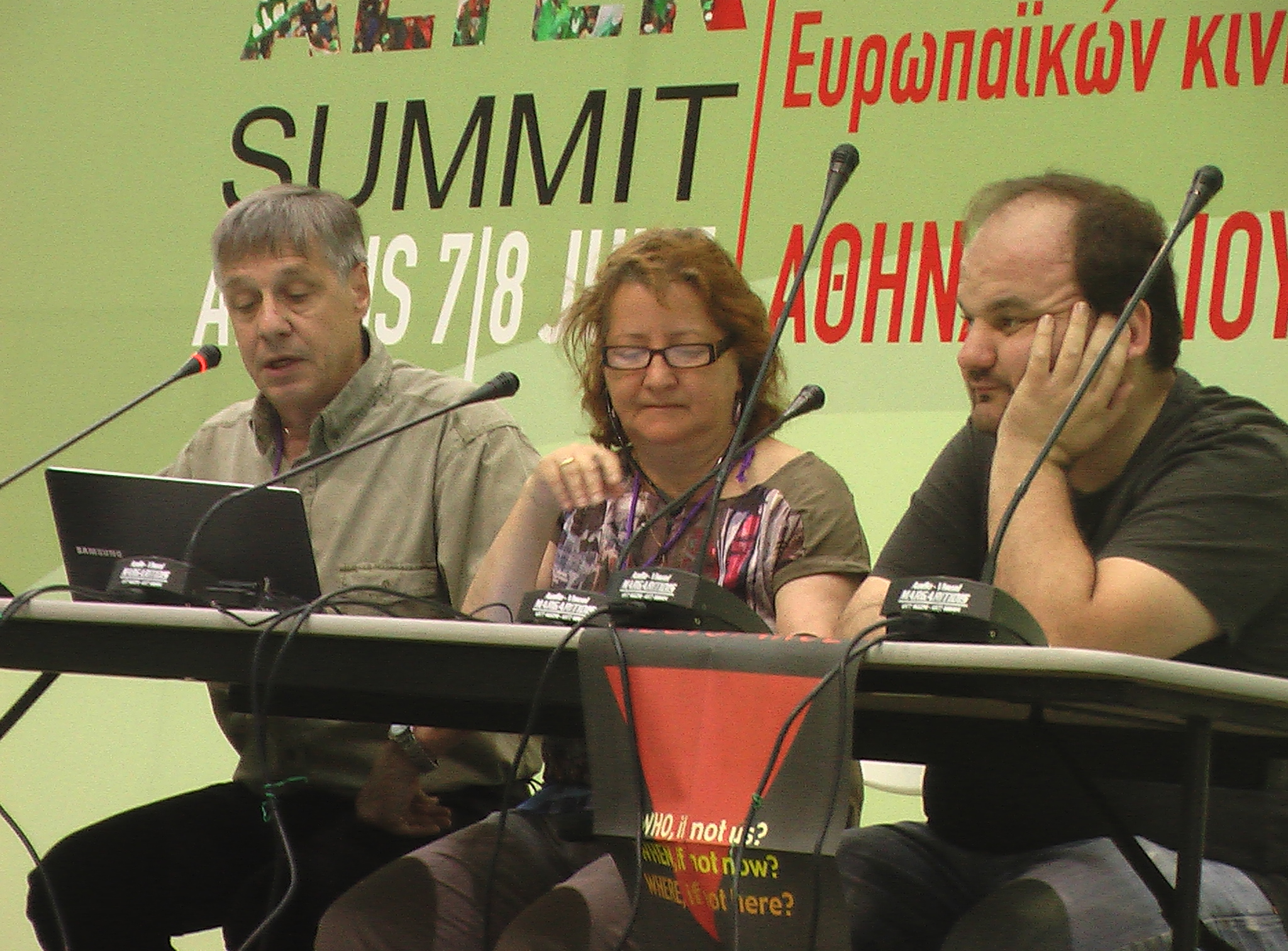 68 years after WW II and the defeat of fascisms we see in almost all parts of Europe the soar of a new extreme Right. The most disturbing fact is that we also experience on the right of it the rise of forces which are openly neonazist and which in some cases are linked with mass movements of an overtly racist, violent and antisemitic character. They aim at the destroying of any kind of free unionising, political and cultural organisation of the working classes, the erasing of civic resistance and the doing away of any right of difference.
68 years after WW II and the defeat of fascisms we see in almost all parts of Europe the soar of a new extreme Right. The most disturbing fact is that we also experience on the right of it the rise of forces which are openly neonazist and which in some cases are linked with mass movements of an overtly racist, violent and antisemitic character. They aim at the destroying of any kind of free unionising, political and cultural organisation of the working classes, the erasing of civic resistance and the doing away of any right of difference.
In France, Switzerland, and Austria, right-wing parties known for racist and nationalist platforms have gained ground. In Germany the immense danger and criminal energy of the neo-nazist underground was recently revealed trough their murderous attacks against migrants as well as the entanglement of their networks with sectors of the state aparatus.
The electoral rise of Golden Dawn in Greece is extremely worrying. Golden Dawn is a nazi gang which is implicated in tenths of criminal attacks to immigrants and refugees. Greek government still tolerates Golden Dawn and its terror.
Nowhere in Europe has a nascent fascist movement made greater inroads than in Hungary, where the far-right Jobbik party („Movement for Better Hungary”) has staked a hold on the hearts and minds of Hungarian youth and won 17 percent of the Hungarian Parliament in 2010.
The rise of neo-nazism and the electoral success of populist right are different phenonema however of the same societal pathology as they reflect the profound political crisis.
Influence and extremism of the Right of the Right differs from country to country. However the generalized application of draconic austrerity policies in Europe with devastating economic, social and cutural effects results in that the rise of the extreme Right in its different types become a common characteristic in Europen societies.
Their social, economic and political agenda converge on the revival of nationalism and hostility towards European integration and international solidarity. Indeed, austerity programs of the EU and the IMF and the authoriterian way in which they are implemented negate the democratic rights achieved in the nation-states and the national dignity of the concerned countries. However nationalism always has proven as a trap.
The conclusion we have to draw is evident: To the extent that the rise of the extreme Right and neonazism do not reperesent exceptions but general trends we have to cope with them as European problems. We therefore appreciate initiatives as the „Antifascist Manifesto” which calls for joint European initaitives in fighting the far Right in all its variants.
The rise of the extreme Right reflects as well the still existing weakness and the lack of credibility of a democratic, social ecological and feminist alternative anchored in a European perspective as demonstrated in the manifesto of the European people.
That’s why the deveolopment of our movement is so important. Historical experience proves, defending the social, ecenomic, democratic, ecological etc. Rights of the people represents the most effective instrument in fighting the extreme Right. Reversely we call all trade unions, social, eclogical and feminist movement as well as all democratic forces to join in the fight against the extreme Right as it represents a peril to democracy and freedom of political expression of all of them.
The fight against the extreme Right and neonzism is at once social, political and cultural one. It embraces the repudiation of sexism, homophobia, anti-semitism, anti-islamism and of any kind of fundamentalism trying to deprive human rights and the right of difference.
We therefore need
n To strenghten European solidarity networks in defence of the populations subjected to the austerity policies of the troika and with the victims of neozist, racist violence.
n European networks capable to organize pan-european campaigns fighting neonazism and right extremism in all dimensions, politcally socialy and culturally.
n In October of this year a working meeting/seminar should be held in Athens in which the analytical and methodological dimension of the fight against the far Right and neonazism should be deepened.
n Use the 8 May (Day of victory over Nazi-fascism) for public events
To strengthen our solidarity, as well as to enhance our visibilty we propose to the Alter Summit to call for a broad, pluralistic European conference of a big symbolic value, in the second half of 2014. The idea to hold this important event in Budapest was largely welcome. The feasibility still has to be examined.
Yannis Almpanis, Walter Baier, Matyas Benyik, Solange Cidreira (faciltating group)
